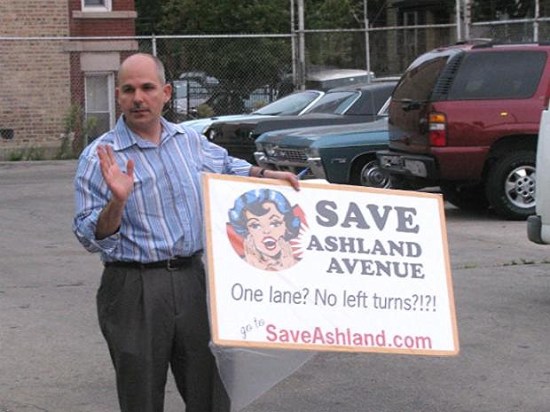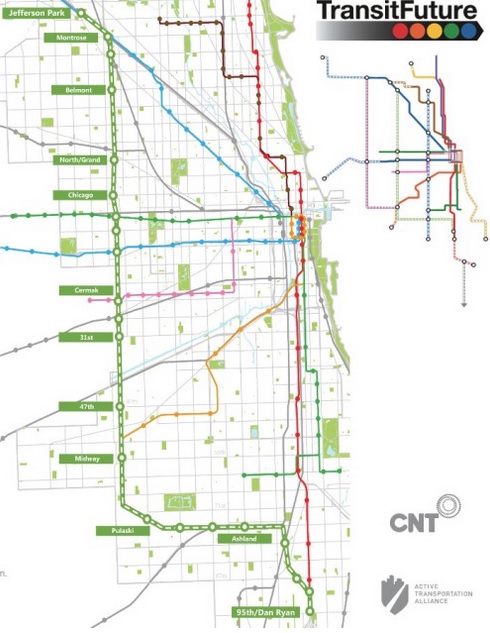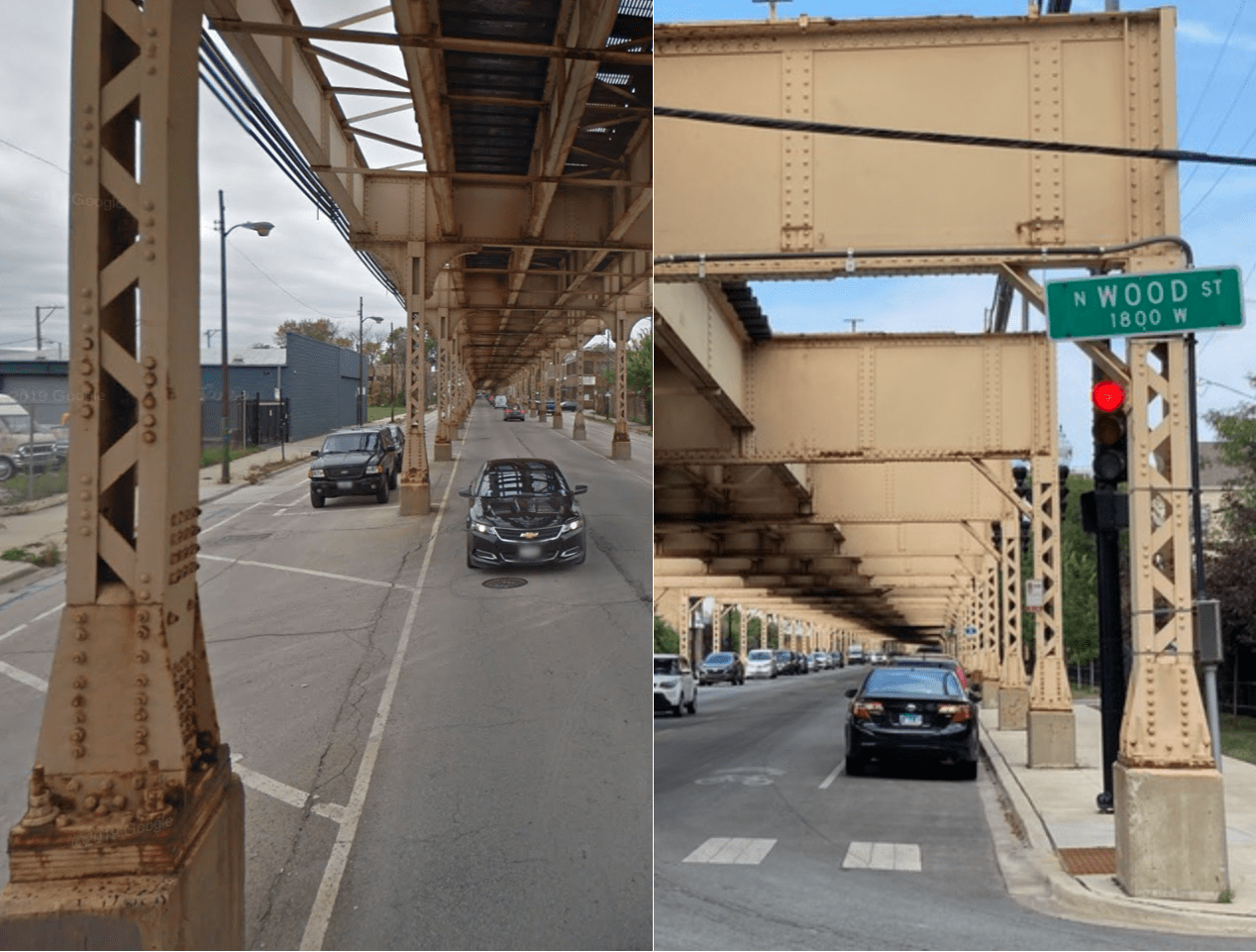There's no question that more transit investment is needed on Chicago's West Side. But the car-centric $2 billion "transit overhaul" being pushed by Roger Romanelli, the man largely responsible for killing the city's Ashland Avenue bus rapid transit proposal, isn't the way to do it.
In the early 2010s, Romanelli, whose day job is leading the Fulton Market Association, organized a misleading Not In My Back Yard-style opposition campaign against the city's plan for fast, reliable express bus service on Ashland connecting the Far South Side with the North Side. Faced with a backlash from residents and merchants who feared driving on the avenue would become less convenient, the city shelved the proposal.

More recently Romanelli, who now lives in west-suburban Hillside, led a campaign to derail state plans to improve safety on the Illinois Prairie Path as part of his effort to get elected village trustee. He's clearly not a legitimate sustainable transportation advocate.
But as reported by the Sun-Times' Manny Ramos, Romanelli has launched the so-called Westside Infrastructure and Safety Coalition. He's calling for spending $2 billion for West Side transportation, out of the roughly $15 billion slated for Illinois public transportation, roads, bridges, and other infrastructure projects under the current federal infrastructure bill.
The coalition would earmark $1.8 billion of that $2 billion for the Lake Street corridor between Laramie (5200 W.) and Talman (2630 W.) avenues. That money would be used to relocate Lake Green Line 'L' columns that are currently in the middle of the road to the sidewalk, and raise the tracks.
While the Sun-Times describes this as a proposal to "overhaul CTA service," it would actually have little or no benefit for train riders. But it would make driving on Lake more convenient for people commuting from the western suburbs (where Romanelli lives) and businesses that use trucks (one of the Fulton Market Association's main constituencies.)
Let’s be 100% clear: this is not a “proposal to help improve public transit on the West Side”, this is a proposal to make it easier for Oak Parkers to drive 50mph down Lake Street that just happens to rebuild a transit line (that we just rebuilt 30 years ago) https://t.co/8zFbqsqHi9
— Star:Line Chicago (@StarLineChicago) August 18, 2021
That $1.8 billion would leave a relatively measly $200 million for other projects in the area Romanelli is proposing. Those include $70 million for a new Green Line stop at Western and $55 million for rehabbing Metra's Kedzie Avenue station on the UP-West line. Those would be worthwhile expenditures, even though service at the Kedzie station is quite limited. (A new $72.9 million Green stop at Damen was supposed to be under construction by now but is still mysteriously delayed – we've asked the city for an update.)
On the other hand, Romanelli wants to spend $15 million for new express bus service service on Lake, which is a laughable idea. What's the point of putting a bus with limited stops right below a faster train with limited stops?
This guy wants to spend $15 million to *add an express bus directly under an existing @cta rail line*. That’s… not how you actually improve transit service!
— Star:Line Chicago (@StarLineChicago) August 18, 2021
Unfortunately, local Congressional rep Danny Davis said he's backing Romanelli's "transit overhaul" that would spend 90 percent of the funding to facilitate driving. "[Romanelli is] really talking about making Lake Street a safer environment for residents and widening the system,” he told the Sun-Times.
However, CTA spokesperson Brian Steele indicated that the agency, which is pushing for funding projects like the $2.3 billion South Red Line extension and bus electrification, takes a dim view of Romanelli's pitch. “CTA prioritizes projects based on age and condition of infrastructure, as well as current and future ridership demand," he told the Sun-Times. That is, it doesn't make sense to spend billions reconstructing the Green Line tracks when they're less than 30 years old and in relatively good shape.
While the Sun-Times amplified Romanelli's ridiculous scheme, Ramos didn't check in when any actual transit advocates or experts, so Streetsblog did.
Oboi Reed, director of the mobility justice nonprofit Equiticity, said he's generally in favor of more transit spending in the long-overlooked West Side. "Priority should be placed on the neighborhoods where transportation related infrastructure is severely lacking and where mobility is the most constricted." He declined to comment on Romanelli's plan.
Active Transportation Alliance spokesperson Kyle Whitehead noted that "there’s no shortage of infrastructure and public transit needs on the West Side," and a transparent process that prioritizes racial and environmental justice should be undertaken to determine which initiatives should be funded. "A process like this would likely demonstrate there are many projects that have gone through more public vetting and provide more clear community benefit than this Lake Street plan."
For example, Whitehead noted, the proposed Lime Line BRT route, which would connect the spokes of the CTA rail system with bus rapid transit, would be a worthwhile, equitable project. "In general, investments in bus service like dedicated lanes and signal priority have proven to be cost effective ways to quickly improve transit for people who rely on it, yet Chicago lags woefully behind peer cities in implementing them."

Metropolitan Planning Council transportation director Audrey Wennink had a similar perspective. She noted that a wide range of transportation advocates supported the recently passed state legislation, HB253, that requires all Illinois Department of Transportation and Regional Transportation Authority investment to go through a transparent and comprehensive analysis. "We need to move away from a politically driven process where people that yell the loudest get the most attention. Such proposals often lack serious analysis and contribute to a fragmented view of our roadway, transit, bike and pedestrian systems."
DePaul University transportation expert Joe Schwieterman also cautioned against funding transportation proposals that haven't been properly thought through. "A key question is whether funding for [Romanelli's] project will come at the expense of other projects in our region that are the product of detailed analysis and public input. Our agencies need to assure that the infrastructure bill doesn't create a 'wild west' environment in which new projects are added at the last moment."
Steve Schlickman, a transportation consultant who previously led UIC's Urban Transportation Institute, dismissed Romanelli's proposal outright. "Given that the Green Line was overhauled in the 1990s, it is too early in its remaining useful life to reinvest billions in it."
So there you have it: There's essentially zero support for Romanelli's absurdly car-centric proposal from people who actually know what they're talking about when it comes to transportation. Here's hoping that Danny Davis drops his misguided backing of this cynical scheme to spend billions to facilitate driving while calling it a transit improvement.





